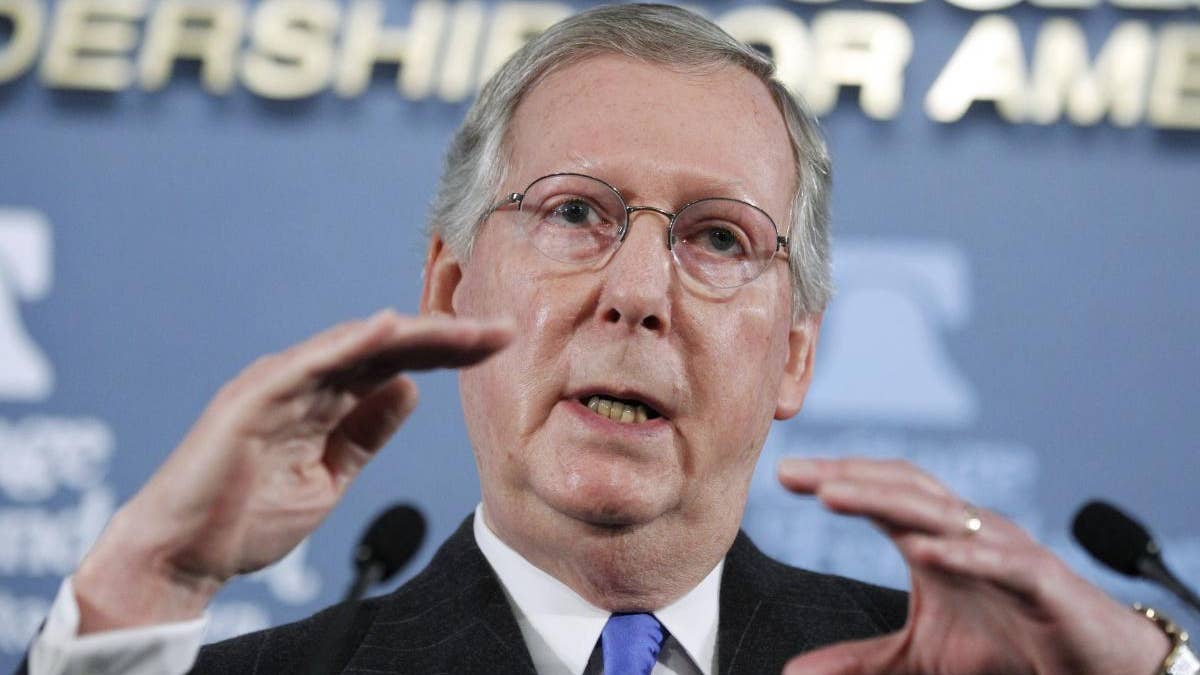
AP Photo
"If the administration wants cooperation, it will have to begin to move in our direction," with that statement, Senate Republican Leader Mitch McConnell, R-KY, on Thursday doubled down on his bold stance against the majority, saying it's time for President Obama and congressional Democrats to shelve their "big-government policies and out-of-control spending."
The leader said Democrats on Tuesday night were "handed a report card" by the voters and that they received "an 'F." In a speech at the conservative Heritage Foundation on Thursday, McConnell made a bold prediction that more Democrats, after having suffered the loss of at least six of their own, will start voting with Republicans. "We have major opportunities for bipartisan coalitions."
Democrats, for their part, have basically struck a similar defiant tone, that Republicans need to join them. "We have made the message very clear that we want to work with Republicans. If they are unwilling to work with us, there's not a thing we can do about that," Majority Leader Harry Reid, D-Nev., told reporters Wednesday.
It's a two-year old argument that seems frozen in time with the election changing no part of that equation in a chamber that did not change hands, unlike the House. Each side appears to have taken a dramatically different lesson from this year's midterms.
Republican leaders have made clear this week that they intend to focus more broadly, as McConnell said Thursday, on the areas of "spending, debt, and private sector job creation."
And McConnell made no apologies for recently suggesting that his number one political goal is to make Obama a one-term president. "If our primary legislative goals are to repeal and replace the health spending bill; to end the bailouts; cut spending; and shrink the size and scope of government, the only way to do all these things it is to put someone in the White House who won't veto any of these things. We can hope the President will start listening to the electorate after Tuesday's election. But we can't plan on it."
That comment, particularly about health care, which McConnell called "the worst piece of legislation that has passed in my time in the Senate," coupled with the leader's announced intention to scrap part or all of the financial regulatory reform bill, provoked an outraged response from the Majority Leader's spokesman.
"It speaks volumes that the first thing on Republicans' 'to do' list is to give power back to big health insurance companies," Jim Manley fired off in an e-mail to reporters. "What Senator McConnell is really saying is, Republicans want to let insurance companies go back to denying coverage to people with pre-existing conditions, let them go back to charging women twice as much for the same coverage as men, and let them push millions of seniors back into the Medicare donut hole."
But McConnell was pulling no punches. "The American people want us to put aside the left-wing wish list and work together on helping to create jobs and restore the economy to health and prosperity," the leader told the gathering in Washington, but it was clear Manley, echoing the sentiments of his boss, was having no part of McConnell's style of compromise. "Republicans have always been the party of putting big business over the middle class, and they are wasting no time in trying to jam through favors for big corporations at the expense of hard-working families who are struggling to make ends meet. If Republicans think the American people want to go back to giving insurance companies free rein to impose their abusive practices on middle-class families and seniors, then they are truly out of touch with the middle class," Manley's e-mail finished.
But Republicans are not entirely united around their announced agenda, particularly in the area of spending. President Obama on Wednesday touched on an area that is likely to be very difficult for Republicans to find anything like unity of thought: an earmark moratorium. McConnell, a long time member of the Appropriations Committee, demurred when asked if he would agree to such a thing, saying, "It's really an argument about discretion" on spending levels.."That's been much talked about on it the campaign trail, and we'll take a look at it when we get back."
McConnell has said he does not want the President to fail, just to change, adding, "As I see it, the White House has a choice: they can change course, or they can double down on a vision of government that the American people have roundly rejected. If they choose the former, they'll find a partner in Republicans. If they don't, we will have more disagreements ahead."
Nuclear power, clean coal technology, plug-in hybrid cars, and reducing carbon emissions, those were particular items McConnell delineated as "areas of potential cooperation" with the president.
But each side this week, so far, has extended an olive branch, one that comes with many caveats and with the ever-present danger that one side or the other (or both) will set it on fire ahead of the 2012 elections.












































